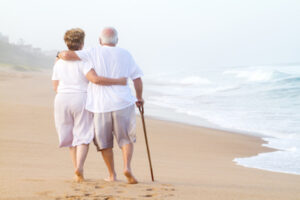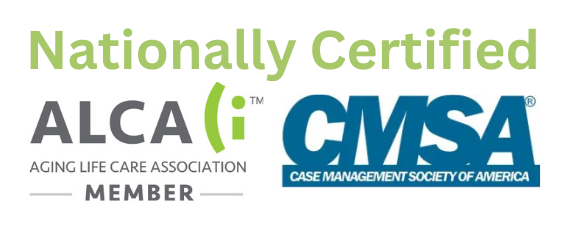 Summer can be fun, relaxing, and lazy, or highly active. It can also be dangerous. Couple high temperatures with higher altitudes and humidity, and seniors can find themselves in serious trouble.
Summer can be fun, relaxing, and lazy, or highly active. It can also be dangerous. Couple high temperatures with higher altitudes and humidity, and seniors can find themselves in serious trouble.
Below are summer tips that will help ensure that aging adults and their caregivers have a fun, injury-free, healthy summer.
Helping Seniors Stay Hydrated
The young and old alike need fluids. As we age, however, we are more susceptible to dehydration because we lose our ability to conserve water and we are less likely to know when we are thirsty. It is important to drink water often, as well as to drink liquids that replace salt and potassium.
Tiredness and mental fatigue can often be attributed to a lack of hydration. Make sure that you are drinking regularly. Take a bottle of water with you when away from home so that you do not have to go for extended periods without something to drink.
Check with Your Doctor
Make sure that your medications are not affected by higher temperatures, some medications lose their effectiveness in extreme heat. It is worth checking with your doctor to see if any of medicines will be affected. This is preferable before the hot weather begins, but it’s never too late to get some advice from a health professional if you are concerned about the effectiveness of your medication.
Coping with Chronic Medical Conditions
This requires that seniors stay in cooler spaces and avoid temperature increases. Even small increases can shorten life expectancy for chronically ill seniors.
Shopping malls offer cool spaces, as do movie theaters and libraries. They help seniors to get out of the house, exercise, and socialize without heat exhaustion.
For seniors without air conditioning, contact your local area Agency on Aging to inquire about programs to assist seniors to get air conditioners or fans. It is important to ask your doctor if you have any conditions or prescription medications that impair your body’s ability to react to rising temperatures.
Stay in Touch with Senior Loved Ones
You need to communicate regularly with aging adults, especially if temperatures are rising. This way you can ensure their safety. It is best to do any gardening or outdoor activity in the early morning when it is cooler. Check in a couple of times a day during high heat to ensure the health and welfare of the elderly living on their own.
Know Your Neighbors
This is especially important if you are on your own. Check in with neighbors and have them check in with you to ensure that you are alright. As well as providing socialization that can help maintain your mood and sense of connectedness, it’s great to have a network of people looking out for each other, particularly when they would be very isolated otherwise.
Know Who to Call In Case of Emergency
Prepare a list of emergency numbers and relatives and keep the list in an obvious, easily accessible place. Also, fill out an emergency checklist and keep it with the emergency contact list.
Pay Attention to What You Wear
When it’s hot outside, many people find natural fibers like cotton and hemp to be cooler than synthetic fibers. It is best to stock your summer wardrobe with light-colored, loose-fitting clothes that help you to feel cool and comfortable.
Protect Your Eyes
There are several reasons why elders need to get their eyes checked regularly, and take measures to protect them. One of these cases is protecting them from excessive exposure to the sun, which can irritate and damage them. Wear sunglasses that protect your eyes from UV rays to help preserve your vision.
Know the Warning Signs of Hyperthermia
This can occur when your body temperature becomes abnormally high. In an advanced state, hyperthermia can cause heat stroke which can be life-threatening.
Warning signs include:
- A body temperature greater than 104 degrees,
- Dry, flushed skin,
- Nausea and vomiting,
- Behavior changes, such as confusion, agitation, and grumpiness,
- Headache,
- Heavy breathing or rapid pulse,
- Not sweating, even in extreme heat.
As we age, we have more difficulty knowing when we are dehydrated and our bodies experience difficulty regulating temperature. If you experience any of the symptoms listed, ask for medical help. Get out of the heat, lie down, and place ice packs on your body.
Wear a Hat and Apply Sunscreen
Whenever outdoors, it’s important to protect your skin and your scalp from burning, especially if you’ve suffered hair loss. A hat also helps to keep you cooler and provides extra protection from the sun.
Use Bug Spray
This is especially true if you live in areas with a lot of mosquitoes. As we age, we become more susceptible to West Nile Virus and Encephalitis.
Follow these guidelines and you’ll be well able to enjoy the summer months without compromising your health no matter what age you are, as these same guidelines are valuable to caregivers too who are taking care of seniors during the summer months. For more tips on ways to keep your senior loved ones safe during the warmer months, contact one of our senior care consultants.








